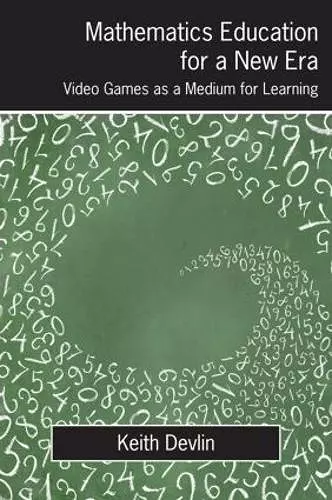Mathematics Education for a New Era
Video Games as a Medium for Learning
Format:Paperback
Publisher:Taylor & Francis Inc
Published:25th Feb '11
Currently unavailable, and unfortunately no date known when it will be back
This paperback is available in another edition too:
- Hardback£190.00(9781138427884)

Stanford mathematician and NPR Math Guy Keith Devlin explains why, fun aside, video games are the ideal medium to teach middle-school math. Aimed primarily at teachers and education researchers, but also of interest to game developers who want to produce videogames for mathematics education, Mathematics Education for a New Era: Video Games as a Medium for Learning describes exactly what is involved in designing and producing successful math educational videogames that foster the innovative mathematical thinking skills necessary for success in a global economy.
Read the author's monthly MAA column Devlin's Angle
… extremely thought provoking and well worth reading. … I highly recommend this book to anyone interested in reflecting on why and how we teach mathematics as well as how we could bring some of the energy that students expend in video games to the mathematics classroom.
—Larry Feldman, Mathematics Teacher, November 2012
Well-written and accessible, with a few illustrations, the book delineates characteristics that teachers might look for when examining games, types of mathematics ideally suited for such an environment, and advantages that such a transformation might have, specifically a self-paced learning environment and motivation for reluctant learners. Devlin includes a collection of resources, both Web and print based, for those interested in further exploring the topic. … Highly recommended.
—S.T. Schroth, CHOICE, November 2011
Keith Devlin makes the case for embracing video games as not just an opportunity for teaching mathematics, but as an ideal medium for doing so. The opportunities gaming provides for learning mathematics are illustrated in great detail. … Devlin makes the case with care, repeatedly drawing on documented studies and educational principles.
—Bill Wood, MAA Reviews, September 2011
Keith Devlin is well qualified to explore these important questions. … Devlin makes the seemingly subtle but very important distinction between ‘doing Math’ and ‘being Math.’ … I hope that educational games designers use his ideas in crafting educational opportunities. And, in the meantime, teachers (and Math circle leaders) would do well to borrow some of the ideas of what works in the virtual worlds for their classrooms.
—Sol Lederman, Wild About Math blog, June 2011
Keith Devlin’s highly readable book sets the foundation for a new approach to learning mathematics where everyone can learn math and finally lose their math fears and phobias. The book is based on empirically well supported and lucidly explicated theories of learning, teaching, and gaming. It will become a classic.
—James Paul Gee, Mary Lou Fulton Presidential Professor of Literacy Studies, Arizona State University and author of What Video Games Have to Teach Us About Learning and Literacy
Keith Devlin’s latest book does a thorough job exploring the affordances that video games can provide to the teaching and learning of mathematics. He covers the current state of affairs and how games provide a great forum for math education.
—Drew Davidson, Director, Entertainment Technology Center, Carnegie Mellon University
Mathematics Education for a New Era connects Devlin’s deep understanding of mathematics education to the new research in digital-games-based learning to pave a path for re-energizing mathematics education.
—Kurt Squire, author of Video Games & Learning: Teaching and Participatory Culture in the Digital Age
Keith Devlin makes an engaging and persuasive argument that online computer games can be a great way to teach basic math skills. Educators and parents who think of video games as empty frivolities will be surprised at the significant educational potential lurking within these complex activities. Game designers can use this book as inspiration for creating new kinds of games that reward players not only with fun experiences and real math skills, but also the important knack of thinking like a mathematician (and liking it!).
—Andrew Glassner, author of Interactive Storytelling: Techniques for 21st Century Fiction
ISBN: 9781568814315
Dimensions: unknown
Weight: 400g
218 pages